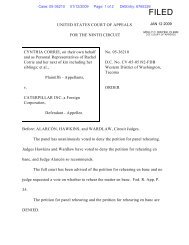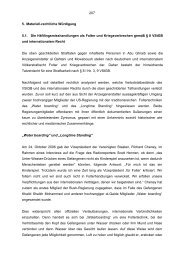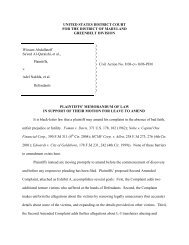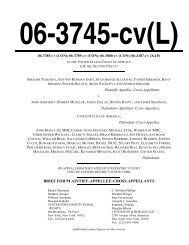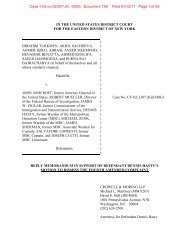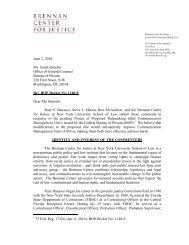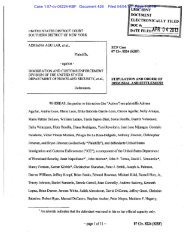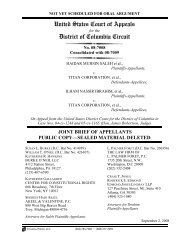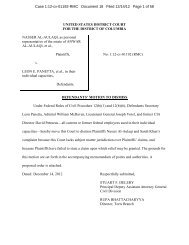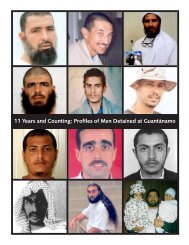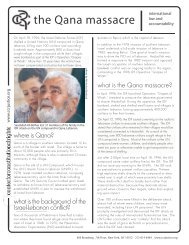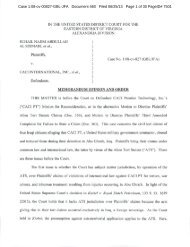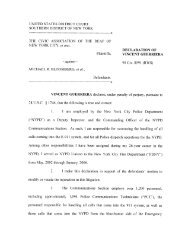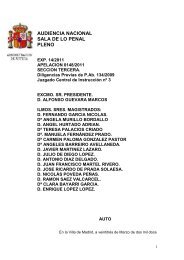CCR Annual Report 2005 - Center for Constitutional Rights
CCR Annual Report 2005 - Center for Constitutional Rights
CCR Annual Report 2005 - Center for Constitutional Rights
You also want an ePaper? Increase the reach of your titles
YUMPU automatically turns print PDFs into web optimized ePapers that Google loves.
COPORATEACCOUNTABILITY<br />
20<br />
<strong>CCR</strong> v Profit at Any Cost<br />
Eight years of persistent litigation by <strong>CCR</strong> and a team of human rights lawyers and<br />
activists in the U.S. and Thailand against the Unocal Corporation <strong>for</strong> human rights<br />
violations in Burma culminated in an historic milestone in the movement <strong>for</strong> corporate<br />
accountability this year. In December the company agreed to a confidential settlement<br />
in Doe v. Unocal, one of the earliest suits filed against a private corporation under the<br />
Alien Tort Statute (ATS). Burmese villagers sued Unocal, alleging its complicity in human<br />
rights violations by the notoriously brutal Burmese military, including slave labor and<br />
widespread rape during the construction of a natural gas pipeline.<br />
November 10, <strong>2005</strong>, marks the 10th anniversary of the summary execution of Ken Saro-<br />
Wiwa and eight other Ogoni leaders who led peaceful protests against Royal Dutch/Shell<br />
<strong>for</strong> their human rights violations and environmental degradation in Nigeria. <strong>CCR</strong>’s suit<br />
against Royal Dutch/Shell was brought in 1996 and triumphed over numerous attempts<br />
by the defendants to end the case on legal grounds. <strong>CCR</strong> anticipates that its case alleging<br />
that the companies were complicit in the deaths of the Ogoni 9 will go to trial in one to<br />
two years.<br />
In March <strong>2005</strong>, <strong>CCR</strong> launched a suit against heavy equipment manufacturer Caterpillar,<br />
Inc., arguing that the company unlawfully provided bulldozers to the Israeli military that<br />
it knew would be used to tear down homes and endanger civilians in the Occupied<br />
Palestinian Territory. <strong>CCR</strong> has charged Caterpillar with complicity in the deaths and<br />
injuries of Palestinians whose homes were destroyed and the death of U.S. activist Rachel<br />
Corrie, who was killed trying to protect a home from demolition. When their homes were<br />
bulldozed in the middle of the night, members of the Al Sho’bi family were killed and<br />
members of the Abu Hussein family were injured. Ibrahim Khalafallah and Jamal Fayed<br />
were killed when they were not able to get out of their homes due to disabilities.<br />
<strong>CCR</strong> set the stage <strong>for</strong> these important cases with its pioneering victory in Filártiga v. Peña-<br />
Irala, which established that victims of human rights violations anywhere in the world<br />
could seek justice in U.S. courts under the Alien Tort Statute. Twenty-five years after<br />
Filártiga, <strong>CCR</strong> continues to spearhead the legal en<strong>for</strong>cement of corporate accountability.



